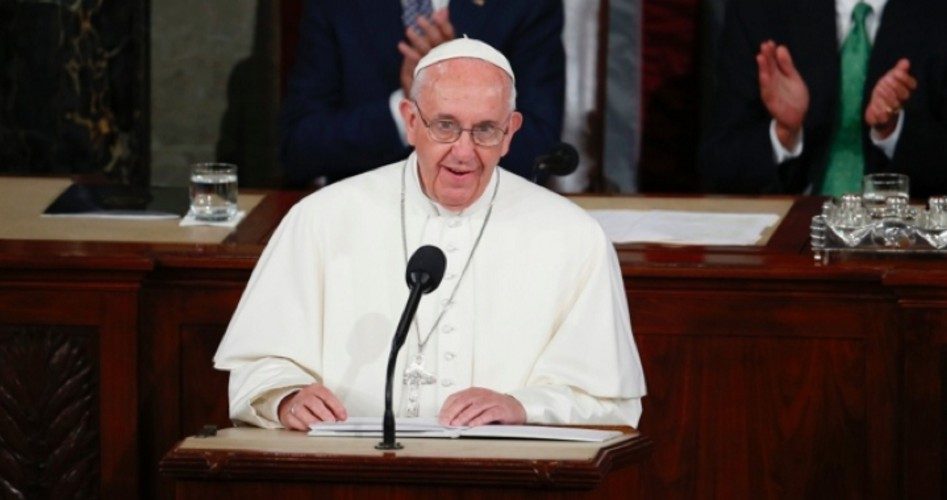
It is perhaps unreasonable to expect an Argentine pope to have a profound and informed appreciation of American history and government; Pope Francis, after all, has dedicated his life to a higher calling than politics, and has spent much of his ministry among the poor of Latin America. For this reason, his address Thursday to Congress may have featured compelling rhetoric, but should not be regarded as a set of serious policy recommendations.
Nevertheless, because Pope Francis’ dislike of certain core American values has been well documented, his words merit attention. If nothing else, Democrats and Leftists generally are enthralled with the new Pope, and are already hoping that his political stances will influence large numbers of American Catholics.
With the poise of a seasoned campaigner, Pope Francis was careful to avoid overt or incendiary statements. But his politics were on display nonetheless. Concerning certain critical issues, Pope Francis said the following:
On government and the free market: “If politics must truly be at the service of the human person, it follows that it cannot be a slave to the economy and finance. Politics is, instead, an expression of our compelling need to live as one, in order to build as one the greatest common good: that of a community which sacrifices particular interests in order to share, in justice and peace, its goods, its interests, its social life. I do not underestimate the difficulty that this involves, but I encourage you in this effort.”
On immigration, including illegal immigration: “On this continent, too, thousands of persons are led to travel north in search of a better life for themselves and for their loved ones, in search of greater opportunities. Is this not what we want for our own children? We must not be taken aback by their numbers, but rather view them as persons, seeing their faces and listening to their stories, trying to respond as best we can to their situation. To respond in a way which is always humane, just and fraternal. We need to avoid a common temptation nowadays: to discard whatever proves troublesome. Let us remember the Golden Rule: ‘Do unto others as you would have them do unto you.’
“This Rule points us in a clear direction. Let us treat others with the same passion and compassion with which we want to be treated. Let us seek for others the same possibilities which we seek for ourselves. Let us help others to grow, as we would like to be helped ourselves. In a word, if we want security, let us give security; if we want life, let us give life; if we want opportunities, let us provide opportunities. The yardstick we use for others will be the yardstick which time will use for us.”
On the death penalty: “This conviction has led me, from the beginning of my ministry, to advocate at different levels for the global abolition of the death penalty. I am convinced that this way is the best, since every life is sacred, every human person is endowed with an inalienable dignity, and society can only benefit from the rehabilitation of those convicted of crimes. Recently my brother bishops here in the United States renewed their call for the abolition of the death penalty. Not only do I support them, but I also offer encouragement to all those who are convinced that a just and necessary punishment must never exclude the dimension of hope and the goal of rehabilitation.”
On the environment: “In Laudato Si’, I call for a courageous and responsible effort to ‘redirect our steps’ and to avert the most serious effects of the environmental deterioration caused by human activity. I am convinced that we can make a difference and I have no doubt that the United States — and this Congress — have an important role to play. Now is the time for courageous actions and strategies, aimed at implementing a ‘culture of care’ and ‘an integrated approach to combating poverty, restoring dignity to the excluded, and at the same time protecting nature’. ‘We have the freedom needed to limit and direct technology’; ‘to devise intelligent ways of… developing and limiting our power’; and to put technology ‘at the service of another type of progress, one which is healthier, more human, more social, more integral’.”
On arms: “Why are deadly weapons being sold to those who plan to inflict untold suffering on individuals and society? Sadly, the answer, as we all know, is simply for money: money that is drenched in blood, often innocent blood. In the face of this shameful and culpable silence, it is our duty to confront the problem and to stop the arms trade.”
Although his remarks were phrased with tact, the anti-free market, pro-government bias is unmistakable. His sympathies for illegal immigrants and their families are unmistakable, though Pope Francis was careful not to traffic in particulars. His opposition to the death penalty, while not an unusual point of view in modern America, certainly does not square with either biblical or American legal tradition.
It is, however, perfectly consistent with Pope Francis’ animus for weapons. Although he was careful to put his comments on arms in the context of ending “armed conflicts throughout our world,” he is clearly referring to recent legislative attempts in the United States to limit access to firearms for those deemed mentally ill or otherwise a public threat.
On environmental issues, he is particularly unsubtle, arguing for further government regulation and control on behalf of unspecified environmental causes. His call for limiting technology is worrisome, echoing the harping of leftist Luddites who despise modern technology and long for a return to fictitious agrarian simplicity. The fact is that technology has raised the standard of living for all Americans (and most of the rest of the world as well), giving billions access to medicines, telephones, the Internet, modern transportation, and the many other benefits of modern life. That Latin America generally has not progressed as far as the “Global North” (including the United States) is a direct result of a seemingly incurable addiction to socialism from the Rio Grande to Tierra del Fuego. The sole exception to this rule on the South American continent has been Chile, which, thanks to a strong commitment to limited government and free market economics, now boasts a standard of living nearly the equal of our own.
Argentina, by contrast, remains one of the world’s economic basket cases, with a long parade of socialist leaders, including the unusually shrill and vehemently anti-business current president, Cristina Kirchner, “robbing selected Peter to pay for collective Paul” across several generations of fiscal futility. The Argentine government since the days of Juan Perón in the mid-20th century has run up massive government debts to fund all manner of socialist conceit, and tried to pay them off by printing money. The result has been chronic hyperinflation and regular defaults on government debt, followed by jarring economic crashes that have made the Greek crisis look benign by comparison.
Nevertheless, on one political and social issue (and withal the most important one), the Pope was spot on: the erosion of family values. To Congress, he said:
It is my wish that throughout my visit the family should be a recurrent theme. How essential the family has been to the building of this country! And how worthy it remains of our support and encouragement! Yet I cannot hide my concern for the family, which is threatened, perhaps as never before, from within and without. Fundamental relationships are being called into question, as is the very basis of marriage and the family. I can only reiterate the importance and, above all, the richness and the beauty of family life.
In particular, I would like to call attention to those family members who are the most vulnerable, the young. For many of them, a future filled with countless possibilities beckons, yet so many others seem disoriented and aimless, trapped in a hopeless maze of violence, abuse and despair. Their problems are our problems…. At the risk of oversimplifying, we might say that we live in a culture which pressures young people not to start a family, because they lack possibilities for the future. Yet this same culture presents others with so many options that they too are dissuaded from starting a family.
Couldn’t have said it better.
Photo of Pope Francis: AP Images



